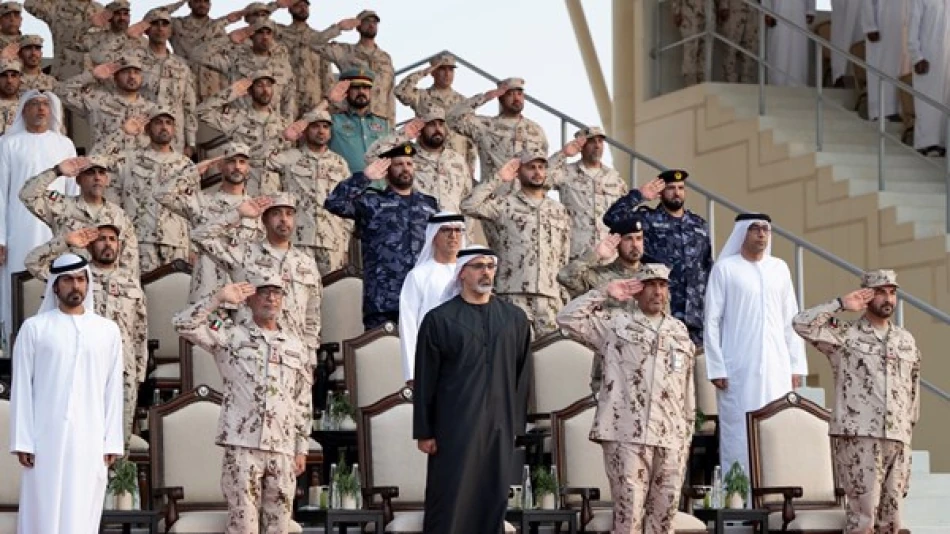
Crown Prince Khalid Witnesses Specialist Displays by National Service Trainees in Swihan Center
UAE's National Service Program Graduates 22nd Batch as Regional Security Concerns Mount
Abu Dhabi Crown Prince Sheikh Khaled bin Mohamed bin Zayed Al Nahyan witnessed the graduation of the 22nd batch of UAE National Service recruits at Suwihan Training Center, highlighting the Emirates' continued investment in military readiness amid growing regional tensions. The ceremony showcased advanced combat skills and tactical proficiency developed during the 2024-2025 training cycle, underscoring the program's evolution since its launch 11 years ago.
Demonstration of Military Capabilities
The graduation ceremony featured comprehensive field demonstrations including combat exercises and tactical maneuvers that reflected the recruits' advanced training. Following the national anthem, graduates displayed their operational readiness through coordinated military displays designed to showcase their professional competency in executing complex military tasks.
The Crown Prince expressed pride in the high skill levels and exceptional discipline demonstrated by the graduates, praising their commitment and national loyalty. He emphasized that these young capabilities represent a fundamental pillar in strengthening national security and preserving the country's achievements.
Strategic Context of UAE's Defense Preparedness
Regional Security Landscape
The graduation comes at a time when Gulf states are increasingly focused on military modernization and youth engagement in defense sectors. Unlike neighboring countries that rely heavily on foreign military contractors, the UAE's National Service program has created a pipeline of locally-trained personnel capable of supporting both regular armed forces and reserve operations.
The program's 11-year track record positions it as one of the region's most established mandatory service initiatives, comparable to similar programs in Israel and South Korea, though adapted to the Gulf's specific security environment and demographic challenges.
Training Evolution and Standards
The current batch received comprehensive training covering theoretical and practical aspects of military science, physical fitness, combat arts, and discipline protocols. This holistic approach reflects lessons learned from previous cohorts and adaptation to modern warfare requirements, including cyber security and asymmetric threat response.
The Suwihan Training Center commander emphasized that these military demonstrations represent the highest standards of readiness and discipline, highlighting young Emiratis' capacity to execute military missions with elevated morale and solid foundations.
Implications for Defense Strategy
Human Capital Development
The program serves dual purposes: enhancing military readiness while instilling civic values in Emirati youth. This approach addresses demographic challenges common across the Gulf, where expatriate populations significantly outnumber nationals, making citizen engagement in national defense particularly crucial.
The emphasis on creating "a generation armed with science and knowledge" suggests integration of advanced technological training alongside traditional military skills, positioning graduates for roles in the UAE's increasingly sophisticated defense apparatus.
Long-term Strategic Value
With regional powers investing heavily in military capabilities, the UAE's focus on developing indigenous defense capacity through mandatory service provides strategic autonomy that purely equipment-based approaches cannot achieve. The program creates a reserve force familiar with modern military protocols while fostering national identity among participants.
The presence of senior military leadership, including Armed Forces Chief of Staff Major General Issa Saif bin Ablan Al Mazrouei and other high-ranking officials, signals the program's continued prioritization within the UAE's broader defense strategy.
As the 22nd batch joins the ranks of program alumni, their integration into various sectors—both military and civilian—will test the program's effectiveness in creating the "future-ready" citizens envisioned by UAE leadership while contributing to national security objectives in an increasingly complex regional environment.
Most Viewed News

 Layla Al Mansoori
Layla Al Mansoori






